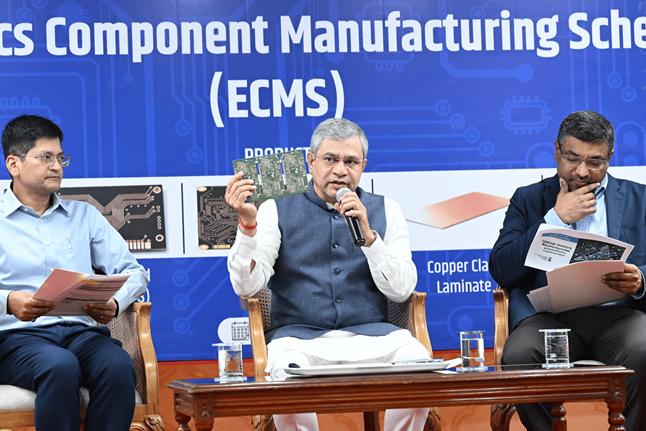In a major boost to India’s electronics manufacturing ecosystem, the government has approved the first batch of seven projects worth ₹5,532 crore under the Electronics Components Manufacturing Scheme (ECMS). Announcing the decision, Union Minister for Electronics and Information Technology Ashwini Vaishnaw said the initiative marks a crucial step in India’s transition from assembling finished products to manufacturing core components, materials, and machinery domestically.
With the approval of these projects, key components such as Multi-Layer Printed Circuit Boards (PCBs), High-Density Interconnect (HDI) PCBs, Camera Modules, Copper Clad Laminates (CCL), and Polypropylene Films will now be ‘Made in India’, reducing import dependence and strengthening supply chain resilience.
The ECMS has received an overwhelming response from both domestic and global companies. So far, 249 applications have been submitted, representing a cumulative ₹1.15 lakh crore investment, projected ₹10.34 lakh crore production, and the creation of 1.42 lakh jobs — the highest-ever investment commitment in India’s electronics sector.
The newly approved seven projects are expected to generate ₹36,559 crore worth of component production and create over 5,100 direct jobs. The projects are geographically distributed across Tamil Nadu (5 units), Andhra Pradesh (1 unit), and Madhya Pradesh (1 unit), ensuring balanced regional growth and the expansion of high-tech manufacturing beyond metropolitan hubs.
Highlighting the impact of these projects, Vaishnaw stated that they will help meet 20% of India’s domestic demand for PCBs and 15% of the demand for camera module sub-assemblies. He further added that the entire domestic requirement for Copper Clad Laminates will now be fulfilled locally, with 60% of additional production targeted for export.
The approved projects cover a range of critical electronic components.
* Camera Modules: Essential imaging units used in smartphones, drones, laptops, medical devices, and automobiles, which will now be produced domestically.
* HDI and Multi-Layer PCBs: Core circuit boards integral to modern electronics including smartphones, automotive systems, and industrial machinery.
* Copper Clad Laminates: A base material for PCB manufacturing, set to be produced in India for the first time.
* Polypropylene Films: Key capacitor materials used across consumer electronics, automotive, telecommunications, and industrial sectors.
According to the Ministry, these initiatives will reduce import dependence, lower product costs, and create high-skill jobs in manufacturing and R&D. They will also help build trusted supply chains for critical sectors like defence, telecommunications, electric vehicles (EVs), and renewable energy.
The ECMS forms a vital part of India’s broader strategy to build a comprehensive electronics manufacturing value chain, complementing the Production Linked Incentive (PLI) scheme and the India Semiconductor Mission (ISM).
Vaishnaw said, “India is steadily transforming into a product nation—capable of designing, manufacturing, and exporting end-to-end electronic equipment. The ECMS bridges the gap between devices and chips, components and materials, manufacturing and innovation.”
With these approvals, India moves closer to realizing its goal of becoming a global hub for electronics manufacturing, driven by innovation, scale, and self-reliance.














